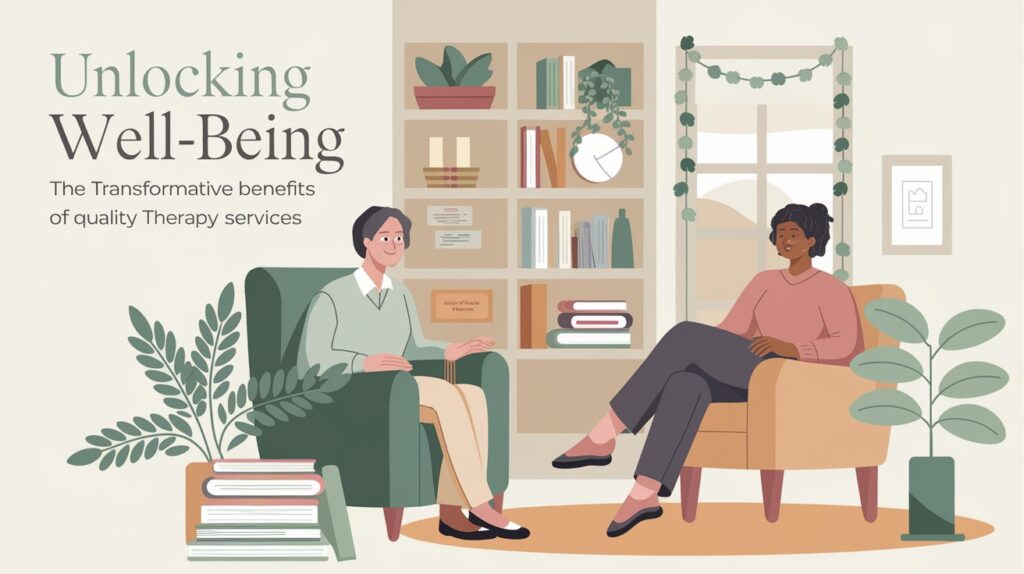Welcome to a journey of self-discovery and mental rejuvenation where quality therapy holds the key to unlocking well-being. The quest for sound mental health is a personal one, but it is also universal in its importance. In a world that often imposes relentless pressure, the role of therapy can be transformative, providing a confidential space to explore emotions, confront challenges, and embrace change.
The Psychological Impact of Professional Therapy on Mental Health
The psychological impact of Baltimore therapy services extends beyond the confines of the therapist’s office. Individuals who engage in therapy often find that it leads to improvements in various areas of mental health, including mood, anxiety levels, and cognitive functions. Therapy can act as a catalyst, igniting the healing process that many are seeking.
Through the course of therapy, a person can learn valuable mental health literacy, which includes recognizing the signs of emotional distress and understanding the importance of self-care. This awareness allows one to take proactive steps towards maintaining well-being both during and after treatment has concluded.
Professional therapy offers tailored approaches that accommodate each person’s unique needs. Cognitive Behavioral Therapy, for instance, equips individuals with tools to address patterns of negative thinking, while psychodynamic therapy delves into the unconscious roots of behavior. Every therapeutic approach aims to establish stability within the individual’s mental landscape.
Consistency in therapy can lead to significant behavioral and emotional changes. People often discover greater resilience, improved relationships, and a renewed sense of self-worth. Such shifts are indicative of therapy’s impact on one’s overall mental health journey.
Navigating Life’s Challenges: How Therapy Provides Coping Strategies
One of the most enduring benefits of therapy lies in the coping strategies it provides for navigating life’s challenges. As individuals face stress, loss, or transition, therapy offers a toolkit for managing these experiences with greater efficacy. These strategies are contours on a map, guiding individuals through rough terrain.
Therapeutic techniques such as mindfulness and stress-reduction exercises can transform an individual’s response to stressors, fostering a more reflective instead of reactive stance. Clients learn to de-escalate their emotional responses and approach problems with a clear and focused mind.
For those grappling with past traumas or ongoing adversities, therapy becomes a powerful ally. Through exposure therapy or trauma-informed care, individuals can safely revisit and reclaim experiences that once held them captive, building strength and resilience in the process.
Importantly, therapy fosters an understanding that coping is not just about enduring hardship but about active engagement with life’s complexities. Therapists help clients to negotiate boundaries, communicate needs, and celebrate progress, laying a foundation for sustainable well-being.
The Ripple Effect of Therapy: Improving Relationships and Social Well-being
The impact of therapy often transcends the individual and sets into motion a ripple effect that can touch every aspect of their social world. Improved communication skills, heightened self-awareness, and better emotional regulation can lead to healthier and more fulfilling relationships.
In therapy, conversations about relational dynamics offer insight into patterns that may hinder personal connections. By working through these issues, clients often report more meaningful interactions with family, friends, and colleagues, contributing to an improved social well-being.
Moreover, the benefits of therapy are felt by those closest to the individual undergoing treatment. As their coping mechanisms and emotional intelligence improve, so too does their capacity to offer support, understanding, and compassion to others. The personal growth experienced within therapy sessions often has a marked effect on the wider social network.
When the quality of personal relationships improves, there is often an upward spiral of positive social and mental health outcomes. For instance, robust social support can reduce feelings of isolation and reinforce the gains made in therapy. It’s in this way that individual transformation can foster collective well-being.
Overall, the transformative benefits of quality therapy services are immeasurable, impacting mental health, personal growth, relationships, and the broader societal fabric. As more individuals seek out quality therapy, the collective shift toward a healthier, more reflective, and supportive community becomes an achievable reality.

